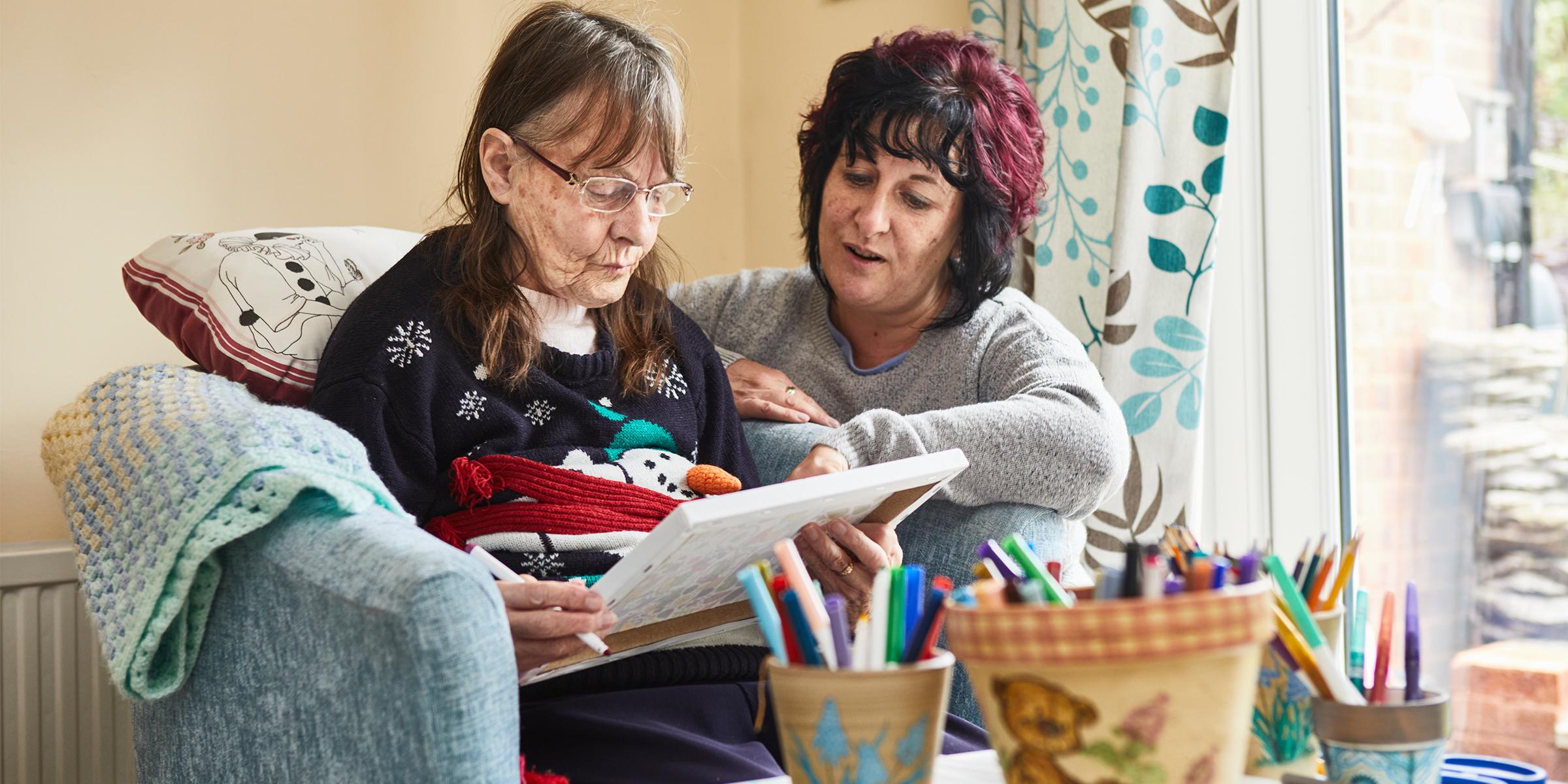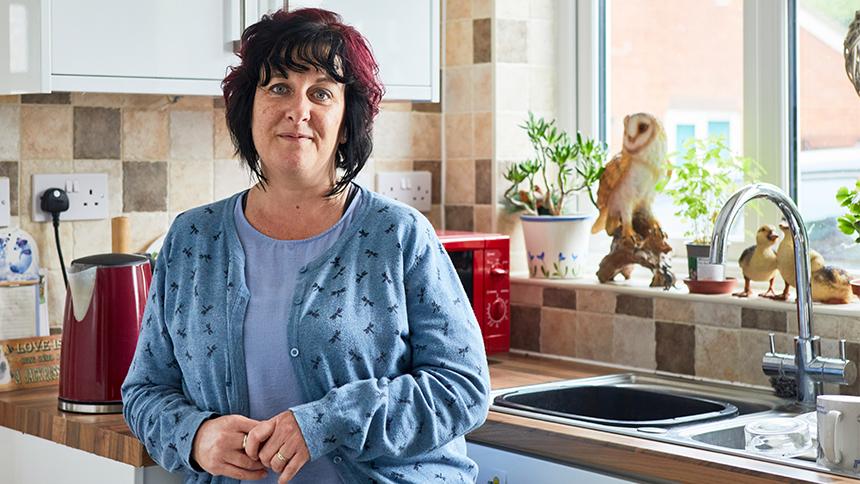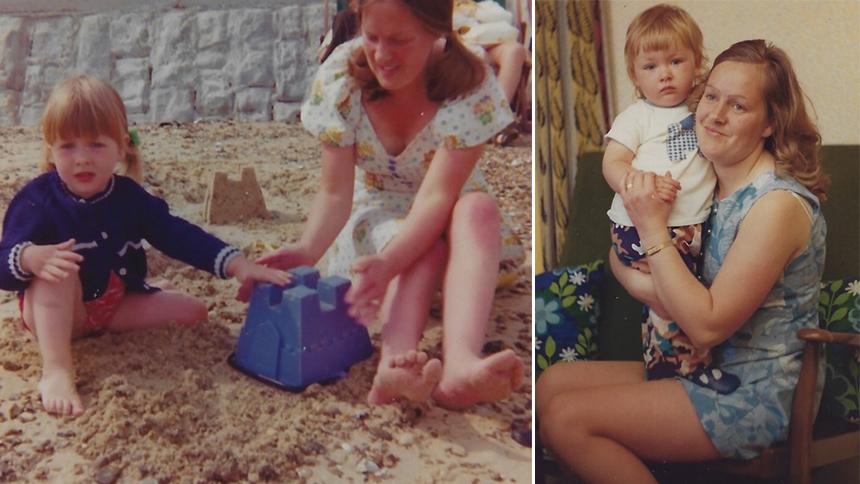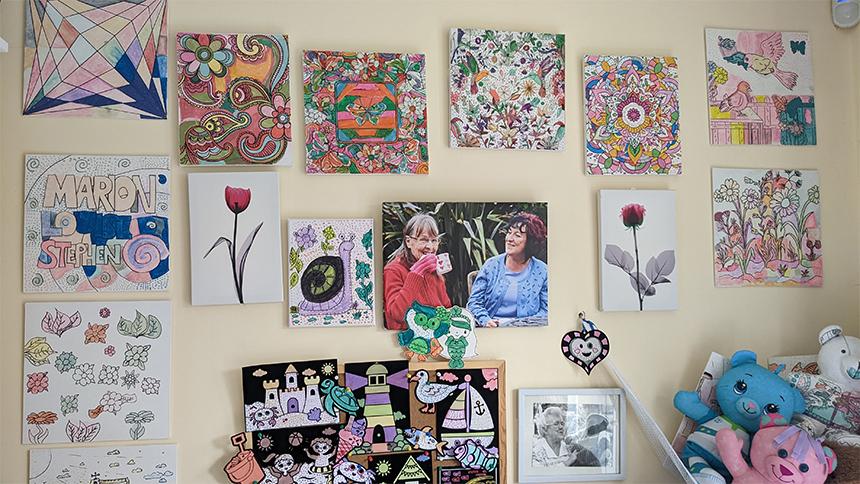
Louise treasures the times she recognises that her mother is ‘still there’ despite her dementia
Louise Yates, in Peterborough, values what she has – especially ‘scrapbook moments’ with her mum.
When Marion goes to help her daughter with the drying up, she’s pleased to play her part with the housework.
‘There’s no point me sitting there doing nothing while you’re busy,’ she tells her. ‘We help each other out, don’t we?’
Louise Yates, her daughter, knows exactly when this conversation took place – in the evening of 22 August 2022.
She can be so precise because it was one of the rare moments in the two and a half years she’s been caring for her mother when the woman she once knew had ‘reappeared’. This had been the first time in two years Marion had picked up a tea towel.
Louise loves these moments. She loves them so much, she writes down her mum’s words in a scrapbook so she can read them over again, reminding herself of the woman she remembers so well and who so often no longer seems there.
For Louise, the scrapbook is also a silent message to those she believes write people off when they receive a dementia diagnosis. They’re proof that the person of old remains.
‘Dementia is the longest, hardest goodbye,’ says Louise. ‘You’re left with a shell of the person you knew.
‘She still looks like Mum, sounds like her, smells like her and feels like her but it isn’t her – then sometimes I get these glimpses of the person she used to be.’

Tough decision
Louise, 49, made the tough decision to give up her job working in special needs for very young children when Marion, now 73, was diagnosed with Lewy body dementia.
‘Everyone needs to be treated with respect,’ says Louise, ‘And if you haven’t got anybody to fight your corner, how do you cope? It doesn’t bear thinking about.’
She knows this because, after her mother’s diagnosis during the first COVID lockdown, the dementia medication she needed was delayed more than six months. Those who could have monitored its effects on her body were dealing with coronavirus. Without the medicines, Marion experienced distressing hallucinations and panic attacks.
Later, Marion’s on-going dizziness was written off as a symptom of dementia. When Louise successfully fought for treatment to correct it, her mum’s life changed completely.
‘Who’s that man?’
At the beginning of the first lockdown, Louise’s father had died suddenly, in hospital and alone. Louise was coping with this shock when, just one week later, her mother was diagnosed with dementia.
By then, Marion had forgotten who her husband was, asking, ‘Who’s that man who used to sit in that chair?’
Louise and her brother Stephen realised their mother couldn’t be left on her own.
Unsupervised, she was taking too much medication and putting on rubber gloves to remove food from the oven. They agreed that Louise should become their mother’s carer.
This means long hours for Louise. For a while, a paid carer gave some support, but she’s had to drastically reduce her hours. Louise’s only other respite is when her brother takes over for a few hours on a Sunday.
She misses spending time with her husband, Andy, and their children, both in their 20s. She also misses her job, which gave her a real sense of purpose.
Louise says, ‘I used to be able to pop home during the day as I have pets there, but that’s become more difficult.’
She can sleep in her own home, using technology to enable her to check on her mother and make sure her mother can contact her.
‘Sometimes she just calls to say she needs a tissue. I always put some up her sleeve and under the pillow to make sure she can find them.’
Before Marion’s diagnosis, she had been forgetting words and couldn’t remember how to tell the time, so the family was concerned.
Then Louise saw her mother talking to somebody in the street. Marion noticed her and said, ‘Do you know, you look just like my daughter?’
‘I said, “That’s because I am your daughter, Mum,”’ says Louise.

Lost in the system
After the diagnosis, Louise waited more than six months for promised support. Then she thinks the memory clinic finally alerted the Society to contact Louise.
‘Mum’s case had been lost in the system. Suddenly, with that call, I wasn’t alone. However much you try your best, you need to talk and get reassurance you are doing the right thing. Everyone should get as much support as they can.’
More help came from the Dementia Resource Centre in Peterborough.
‘When I step in the door, it’s like somebody’s giving me the biggest hug. It’s a family of support. In a world that’s lonely, challenging and disheartening, the centre is a breath of fresh air, enriching people’s lives.
‘It’s the only place I feel totally comfortable. If Mum’s wearing odd shoes, I know no one will make a hurtful comment. If I took her to Tesco, someone might point it out and her feeling of achievement at getting dressed will have gone.’
Big love
Marion’s big love is colouring-in, not something she did before she had dementia. She lives in a colourful grotto of drawings in her home. One unexpected development is that she’s made a special friend at the centre, and she’s introduced him to colouring too.
‘Some days Mum won’t speak to me at all, but whenever Alan is there, they’ll sit next to each other chatting for hours. It warms my heart. It’s like lotus flowers growing from terrible conditions.’
Louise uses her knowledge of the way children develop to comprehend the reverse is happening with her mum who is gradually losing her understanding.
‘No matter how much they change, you still love them and want to do your very best by them, even at the expense of your own life. In some ways it feels like my life has ended because caring for my mum is all it is, 365 days a year.’
Proper wage
Despite this, she was recently one of the guest speakers at an event involving councillors, caregivers, others from the care sector, and people diagnosed with dementia. This experience brought back some of the feelings of achievement she’d felt at work.
This has made her determined to do more campaigning for people with dementia and their carers. She’s worked out that, not including call outs at night, her carer’s allowance of £84 a week amounts to 80p an hour.
She wants the government to pay a proper wage to family members in her situation so more can give up their jobs to help those they love, relieving the care system of pressure.
Louise also loves writing about her experiences, believing carers need to express themselves to help deal with the loneliness and see the positives.
‘Mum doesn’t always know who I am, though she knows I’m someone she trusts. The work gets harder because now she’s incontinent, but I love her. Life’s hard, and it can also be rewarding.
‘I think Mum’s probably living her best life now. She’s had a hard life and has no memories of that. She’s happy doing her colouring. She doesn’t realise she’s poorly. When I clean her up, she thinks I’m being a nuisance because I’m interrupting her colouring.’

Value each day
Caring for her mum has changed Louise.
‘The thing I’ve learned more than anything is how much we take for granted, like being able to go for a walk whenever we want or read a book. I’ll never take that for granted again.’
She doesn’t take her mum for granted either.
‘I know I might not always be the best person to look after Mum, so I value each day. When I find things hard, it helps to remember that one day I’ll be wishing I could experience what I’m struggling with now.
‘When she asks the same question over and again, I remind myself she may lose her ability to talk, and I won’t hear her voice anymore. It’s about valuing what we have.’
And this brings Louise back to another scrapbook moment when her ‘old mum’ reappeared.
‘Mum asked if we were seeing her friend. I said we could go to the café to see if he was there,’ remembers Louise.
‘Then Mum thought for a minute and out of the blue said, “Or if it’s just you, that’s fine with me – because you’re my daughter and I love you.”’
How can you help?
£50 could pay for a dementia adviser to give vital support and advice to eight people on our support line.

